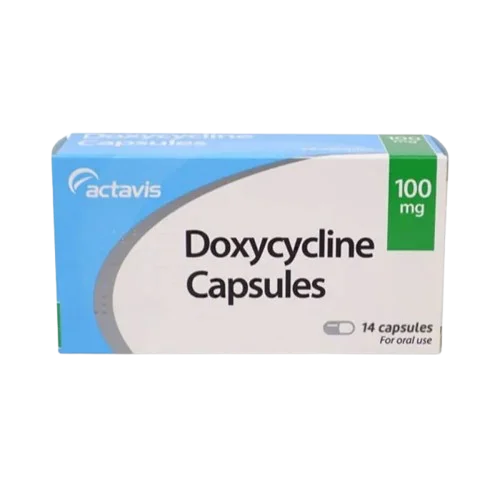It has Versatile Usage, treats Respiratory Infections, Urinary Tract Infections (UTIs), Sexually Transmitted Infections (STIs), Skin Infections & Acne, MRSA, Tick-Borne Diseases, Rocky Mountain spotted fever, Malaria Prevention & Treatment, and Anthrax & Bioterrorism Exposure Prevention. Doxycycline 100 mg has Fewer Side Effects and less impact on gut bacteria. It is a safer alternative to penicillin-based drugs for people with penicillin allergies. It is effective in Short & Long-Term Use. You can use it for short-term bacterial infections or long-term for acne, rosacea, or malaria prevention.
What is Doxycycline 100mg?
Doxycycline 100mg is a tetracycline-class antibiotic that inhibits bacterial protein synthesis, stopping bacteria from growing and multiplying.
Doxycycline 100mg Mechanism of Action
Blocks Bacterial Protein Production
Doxycycline Pills binds to the 30S ribosomal subunit of bacteria. It prevents tRNA (transfer RNA) from attaching, stopping the production of essential proteins.
Without proteins, bacteria cannot grow, divide, or survive.
Bacteriostatic Effect (Stops Bacterial Growth)
Doxycycline 100mg stops the growth of Bacteria, allowing the immune system to clear the infection.
Broad-Spectrum Action
It is effective against Gram-positive and Gram-negative bacteria and atypical bacteria like Chlamydia, Mycoplasma, and Rickettsia. It fights parasites like malaria and some acne-causing bacteria.
Anti-Inflammatory Properties
It reduces inflammation in acne and rosacea by blocking inflammatory cytokines. It helps prevent tissue damage caused by bacterial infections.
Why is the Doxycycline Mechanism Unique?
This antibiotic works Against Antibiotic-Resistant Bacteria. It is effective where penicillins and cephalosporins fail. Doxycycline does not affect Human Cells. It targets bacterial ribosomes, which differ from human ribosomes. Doxycycline Capsules has a Long-Lasting Action. It stays in the body longer than other antibiotics, allowing for once or twice daily dosing.
What are the Uses and Benefits of Doxycycline 100mg?
Uses of Doxycycline 100mg – What Does Doxycycline 100mg Treat
Doxycycline 100mg is a broad-spectrum antibiotic that treats bacterial infections, acne, and certain parasitic illnesses.
- Respiratory Infections – Pneumonia, bronchitis, sinusitis
- Sexually Transmitted Infections (STIs) – Chlamydia, gonorrhea, syphilis
- Urinary Tract Infections (UTIs) – Complicated and resistant infections
- Skin Conditions & Acne – Moderate to severe acne, rosacea, MRSA skin infections
- Tick-Borne Diseases – Lyme disease, Rocky Mountain spotted fever, and Ehrlichiosis.
- Malaria Prevention & Treatment – Used in malaria-prone areas
- Anthrax Exposure Prevention – Recommended by the CDC & WHO
- Eye Infections – Conjunctivitis caused by Chlamydia
- Gum Disease (Periodontitis) – Reduces inflammation and bacterial growth in the gums
- Traveler’s Diarrhea & Gastrointestinal Infections – Caused by E. coli and Vibrio cholera.
Doxycycline 100mg Benefits – Why Choose Doxycycline 100mg
- Broad-Spectrum Coverage – It works against Gram-positive, Gram-negative, and atypical bacteria.
- Fights Antibiotic-Resistant Infections – It is effective where penicillin-based antibiotics fail.
- Long-Lasting Effect – It requires only once or twice daily dosing.
- Great for Acute & Long-Term Use – Used for short-term infections and long-term treatment for acne, rosacea, and malaria prevention.
- Well-Absorbed Orally – No need for IV administration, making it convenient.
- Dual Action: Antibiotic & Anti-Inflammatory – Reduces bacterial infections and inflammation in acne and gum disease.
- Safe Alternative to Penicillins – It is suitable for people allergic to penicillin-based drugs.
- Fewer Gut Side Effects Than Stronger Antibiotics – It does not kill gut bacteria as aggressively as fluoroquinolones.
What are the Doxycycline Dosages?
The dosage of Doxycycline 100mg depends on the infection type, severity, patient’s age, and medical condition.
Standard Adult Doxycycline Dosage
- Usual dose: 100mg once or twice daily
- Treatment duration: Varies based on the infection
Infection-Specific Dosage
Respiratory Infections (Pneumonia, Bronchitis, Sinusitis)
100mg twice daily for 7-14 days
Urinary Tract Infections (UTIs)
100mg twice daily for 7-10 days
Sexually Transmitted Infections (STIs) – Chlamydia, Gonorrhea, Syphilis
Chlamydia: 100mg twice daily for 7 days
Gonorrhea: 100mg twice daily for 7 days (alternative to azithromycin)
Syphilis (if allergic to penicillin): 100mg twice daily for 14-28 days
Acne & Rosacea
100mg once daily for several weeks to months (as prescribed by a doctor)
Tick-borne diseases (Lyme disease, Rocky Mountain spotted fever, and Ehrlichiosis).
Lyme disease (early stage): 100mg twice daily for 10-21 days
Rocky Mountain spotted fever: 100mg twice daily for 5-7 days
Malaria Prevention (Prophylaxis in Endemic Areas)
Take 100mg once daily, starting 1-2 days before travel, continuing throughout the trip, and 4 weeks after leaving the area.
Anthrax Exposure Prevention
100mg twice daily for 60 days
Periodontal (Gum) Infections
100mg once daily for 21 days
Traveler’s Diarrhea & Gastrointestinal Infections
100mg twice daily for 5-7 days
Children (Above 8 Years Old)
Dose: 2mg per kg weight every 12 hours.
Doctors do not recommend it for children under 8 years old because of the risk of tooth discoloration.
Older Patients
Administer the dosage used in adults, but monitor kidney/liver function.
Patients with Kidney or Liver Disease
You may need dose adjustments in severe liver disease.
Important Dosage Tips
- Take with a full glass of water to prevent throat irritation.
- Stay upright for 30 minutes after taking it to avoid esophagus irritation.
- Avoid taking it with dairy products, calcium, or iron supplements (reduces absorption).
- Complete the entire course, even if symptoms improve early.
How to take Doxycycline 100mg?
Doxycycline Dosage & Timing
Take one Doxycycline tablet (100mg) once or twice daily, as prescribed. Try to take it on a fixed schedule each day to maintain steady levels in your body.
Take with Plenty of Water
Swallow Doxycycline tablet whole with a full glass of water (at least 8 ounces). Do NOT lie down for at least 30 minutes after taking it to prevent irritation of the esophagus.
With or Without Food?
It is best taken on an empty stomach (1 hour before or 2 hours after meals) for better absorption. If it causes stomach upset, take it with a small meal or snack (but avoid dairy). Avoid dairy products (milk, yogurt, cheese) and calcium-rich foods when taking the dose, as they can reduce absorption.
What to Avoid While Taking Doxycycline
- No dairy products, antacids, iron, or magnesium supplements within 2 hours before or after taking the tablet.
- No alcohol, as it can reduce the effectiveness of Doxycycline Tablets.
- Limit sun exposure- Increases sun sensitivity, so wear sunscreen and protective clothing.
Completing the Full Course
- Take the entire prescribed course, even if you feel better.
- Stopping earlier than the schedule can lead to antibiotic resistance and recurrence of infection.
Missed Dose
Take it as soon as you remember, and if it is almost time for the next dose, skip the missed one and continue as usual. Do NOT double the dose to catch up for a missed one.
When Should I Avoid Doxycycline or Use Doxycycline 100mg Cautiously?
Avoid Doxycycline 100mg If You Have:
Allergy to Doxycycline or Tetracyclines
If you are allergic to Doxycycline, minocycline, tetracycline, or other tetracycline antibiotics, avoid it.
Pregnancy (Second & Third Trimester)
It can harm fetal bone and tooth development, leading to permanent tooth discoloration in the baby.
Children Under 8 Years Old
It may cause permanent tooth discoloration and affect bone growth.
Exceptions: Used in severe infections like Rocky Mountain spotted fever and anthrax exposure when benefits outweigh risks.
Severe Liver Disease (Hepatic Impairment)
The liver metabolizes Doxycycline. Hence, severe liver disease may worsen toxicity.
Myasthenia Gravis
It can worsen muscle weakness and breathing issues.
Use Doxycycline 100mg with Caution If You Have:
Kidney Disease (Chronic Kidney Disease - CKD)
Doxycycline is safer than other tetracyclines for kidney patients, but monitor the patients in severe cases.
Esophageal Disorders (GERD, Acid Reflux, Hiatal Hernia)
It can cause irritation, ulcers, or a burning sensation in the throat if you do not take it correctly. Take with plenty of water and remain upright for at least 30 minutes.
History of Yeast Infections or Gut Issues (Dysbiosis)
It may lead to yeast infections (oral thrush, vaginal candidiasis) or gut imbalances. Take probiotics (at least 2 hours after Doxycycline) to prevent gut issues.
Sun Sensitivity (Photosensitivity)
It increases the risk of sunburn and skin rashes. Use sunscreen (SPF 30+), wear protective clothing, and avoid prolonged sun exposure.
History of Intracranial Hypertension (Increased Brain Pressure)
Rarely, Doxycycline may increase brain pressure, leading to severe headaches, vision problems, or nausea.
Taking Blood Thinners (Warfarin) or Anti-Seizure Medications
It may increase bleeding risk when taken with Warfarin. Anti-seizure drugs (like Phenytoin or Carbamazepine) can reduce doxycycline effectiveness.
What are the side effects of 100mg of Doxycycline?
Common Doxycycline 100mg Side Effects
- Gastrointestinal Side Effects (Most Common)
- Skin & Sun Sensitivity
- Esophagus Irritation or Ulcers
- Mild Neurological Effects
- Yeast Infections (Oral or Vaginal)
Severe Doxycycline 100mg Side Effects
- Severe Allergic Reactions (Anaphylaxis)
- Severe Skin Reactions
- Severe Sun Sensitivity (Photosensitivity Reaction)
- Esophageal Ulcers & Severe Throat Irritation
- Intracranial Hypertension (Increased Brain Pressure)
- Clostridium difficile (C. diff) Infection
- Liver or Kidney Damage





